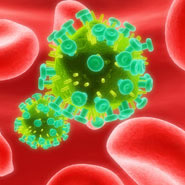|
 12 October 2011 - New research has found the life expectancy of HIV-positive individuals in the UK has increased by over 15 years since 1996. The findings, published today [12 Oct 2011] in the BMJ, suggest that improvements in antiretroviral therapy treatment has helped people with the disease to live longer. 12 October 2011 - New research has found the life expectancy of HIV-positive individuals in the UK has increased by over 15 years since 1996. The findings, published today [12 Oct 2011] in the BMJ, suggest that improvements in antiretroviral therapy treatment has helped people with the disease to live longer.
Until now, few studies have estimated how long those with HIV in the UK are likely to live. The Medical Research Council (MRC)-funded
study, led by academics at the University of Bristol and UCL, examined the life expectancy for individuals treated for HIV in
comparison with the UK population.
Using data from the UK Collaborative HIV Cohort (UK CHIC) study on 17,661 patients who started antiretroviral therapy between 1996-2008,
the researchers estimated the additional years that will be lived by an HIV-positive individual after age 20. The team found that the
average life expectancy in HIV-positive individuals has increased from 30 years in 1996 to 1999 to just under 46 years in 2006 to
2008 although this is still 13 years less than that of the UK population.
Starting treatment later than guidelines suggest resulted in up to 15-years loss of life: at age 20, life expectancy was 53 years in
those starting antiretroviral therapy with CD4 count between 200 and 350 cells compared with 38 years in those with CD4 count below
100 cells.
The findings also reveal a ten-year higher life expectancy of women compared with men who are treated for HIV-infection. During the
period 1996 -2008, life expectancy was 40 years for male patients and 50 years for female patients compared with 58 years for men
and nearly 62 years for women in the general UK population.
Dr Margaret May, lead author and Senior Research Fellow in the University's School of Social and Community Medicine, said: "Our
research has found life expectancy in the HIV-positive population has significantly improved in the UK. We should expect further
improvements for patients starting antiretroviral therapy now with improved modern drugs and new guidelines recommending
earlier treatment."
"However, the results show a 15-year loss in life expectancy of those who start antiretroviral therapy at a more advanced stage of
disease so there is a need to identify HIV-positive individuals early in the course of their infection before substantial CD4
loss has occurred to avoid the very large negative impact this has."
Mortality rates have decreased such that, compared with the general population, the risk of death in successfully treated HIV-positive
patients is similar to that of persons with unhealthy lifestyles (e.g. heavy smoking, drinking or obesity) or other chronic conditions
such as diabetes.
Dr May added: "Our findings strongly support the concept of more widespread HIV testing. It is also of clear benefit to patients to
have the prognosis made in terms of their life expectancy and this might have considerable impact on patients' uptake of testing."
Dr Mark Gompels, lead clinician and co-author, North Bristol NHS Trust, said "These results are very reassuring news for current
patients and will be used to counsel those recently found to be HIV-positive."
###
Further information:
HIV
The human immunodeficiency virus (HIV) attacks the body's immune system. A healthy immune system provides a natural defence against
disease and infection. If the immune system is damaged by HIV, it increases the risk of developing a serious infection or disease,
such as cancer.
HIV infects particular cells, called CD4 cells, that are found in the blood. CD4 cells are responsible for fighting infection. After
they become infected, the CD4 cells are destroyed by HIV. Although the body will attempt to produce more CD4 cells, their numbers
will eventually decline and the immune system will stop working. Treatment with antiretroviral therapy suppresses replication of
HIV, increases CD4 cell count and restores the immune system.
Source: University of BRISTOL
http://bristol.ac.uk/news/2011/7954.html
|